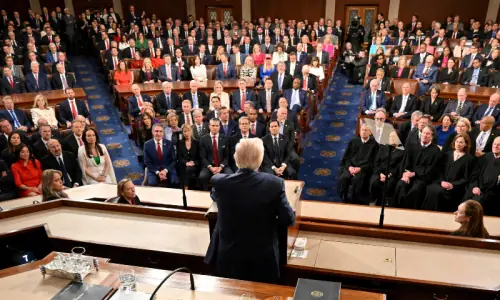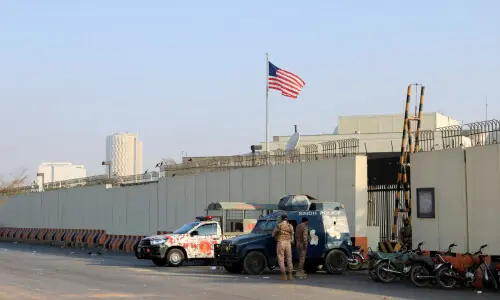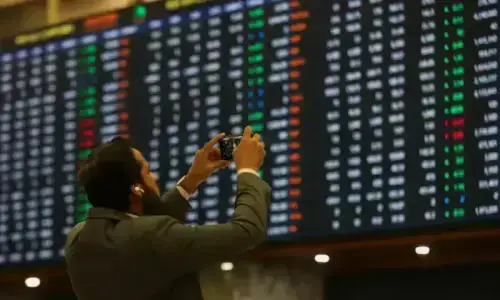THE Judge Arshad Malik saga is a tragicomedy. His affidavit submitted in the Islamabad High Court is being seen as a testimony of his compromised character. It also exposes the sad state of our lower judiciary and its apparent vulnerability to manipulation. In his statement, the judge confesses to being blackmailed and claims that the Sharif family tried to bribe him.
But in a purported video conversation, he reportedly talks about convicting the former prime minister under duress. While the credibility of the video has yet to be established, Judge Malik did not deny talking to the persons in the video. The whole episode is scandalous. The judge may have been removed from the accountability court but no disciplinary action has been taken against him as yet.
Surely the higher courts will decide his fate and the validity of his ruling in the graft case against the former prime minister. However, it is not just a legal matter; the scandal has become an explosive political issue with both the opposition and the government trying to use the controversy against each other and engaging in a toxic blame game. The incident has brought into question the entire accountability process, given the alleged susceptibility of judges to pressure from state elements and from the rich and powerful.
True, it’s not the first such case in our judicial history, but there is greater notoriety attached to it on account of it being a politically high-profile incident. The real issue related to the credibility of the entire judicial system has been lost in the cacophony of political point-scoring. The case of Judge Malik epitomises the ugly face of our judicial system.
The Judge Arshad Malik scandal has become an explosive political issue.
While the role of the establishment and executive in influencing judicial process is not unheard of here, power and money are also said to be used to bend the law, thus making a mockery of the idea of justice and a fair trial. There may be some talk of a controversial trial; there is also the question of why the Sharif family maintained contact with the accountability judge.
It seems that Judge Malik was unaware he was being videotaped. The video was released by the PML-N. The inquiry into the affair could lead to more troubling information. Politicisation of the scandal has made things more complicated. It seems that all sides will be sullied.
It is often said that the independence of the judiciary and the notion of fair trial are myths. It is not only military regimes and the establishment that purportedly seek to control the judiciary; civilian governments and political parties are also accused of trying to manipulate the system for their own vested interests.
There have been previous instances where the top court has been stormed; there have been allegations that some judges had been bribed and intimidated and judgements dictated. Some judges alleged on record that the intelligence agencies openly influence the courts. It is not just about Judge Malik; it is also a crisis of the country’s judicial system. There are past examples of judges compromising the judiciary’s independence. Self-serving judicial activism and populism arguably damaged the sanctity of the apex court.
Heralded as the ‘black coat revolution’, the lawyers movement of 2007 was an epic struggle. Although it started as a protest against the removal of then chief justice Iftikhar Chaudhry by Gen Pervez Musharraf, it soon turned into a movement for democracy. The movement drove a historic wedge between the judiciary and executive. It ended the decade-long military-led rule and helped return the country to the path of democracy. It was a historic moment when the chief justice and other judges of the superior judiciary were restored. The resistant judiciary promised to protect its independence and continue its march towards the establishment of the rule of law. But did those lofty ideals cloak another set of interests?
Ironically, it was Iftikhar Chaudhry, catapulted to an iconic status during the struggle, who did the most damage to the apex judiciary after being restored. His populism and arrogance brought the judiciary on a collision course with the executive. He virtually tried to establish judicial despotism in clear negation of the basic principles. Some of his judgements cost his institution and the state dearly. His own integrity became questionable after allegations of financial misdeeds against his son.
Some of his actions also threatened the independence of the judiciary. Nothing was done to reform the system. A number of lawyers and members of the bar who had been in the forefront of the resistance movement were also accused of being responsible for the regression. The so-called revolution turned into a nightmare.
Some of the chief justices who succeeded Chaudhry did try to inject balance and sanity into the system. But their efforts were undermined by the last chief justice Saqib Nisar. His activism went far beyond that witnessed under Chaudhry, with no limits to his populism. His crowdfunding for dam construction became an embarrassment. His ambition to establish a legacy also compromised judicial independence. Allegations of intelligence agencies influencing the courts became more common.
Justice Shaukat Siddiqui of the Islamabad High Court went public with his accusations against the ISI. He was known for his retrogressive views and some highly controversial judgements. A case of financial wrongdoing had been pending against him for some time. But there were concerns that he was removed soon after he made those allegations.
Some normality seems to have returned to the superior court after Justice Nisar’s retirement but it will take time to reverse course. The judiciary cannot afford judges with populist agendas. Not only does this damage the judiciary, it also limits judges’ independence.
The case of Judge Arshad Malik must not be seen in isolation. Judges like him are the product of a system where the judiciary is pulled into a vicious power game that compromises its independence. A tainted judiciary would be in danger of being seen as the biggest threat to the rule of law and democracy.
The writer is an author and journalist.
Twitter: @hidhussain
Published in Dawn, July 17th, 2019
































